Altman, who no longer has everything, has become a more pragmatic businessman.
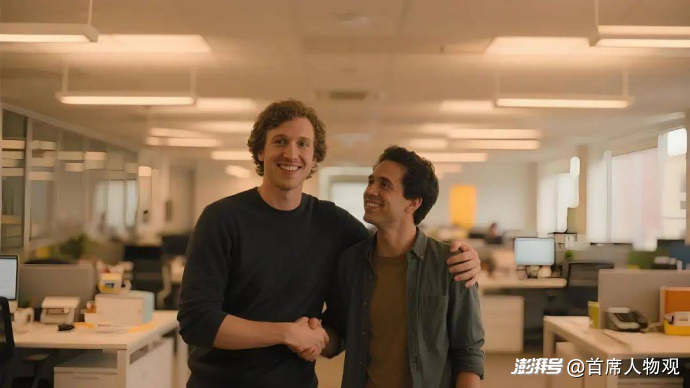
Author | Fu Rao
In the Silicon Valley circle, no successful tycoon can escape a question: What advice would you give to young entrepreneurs?
As the hottest new generation of entrepreneurs in the field of AI, Sam Altman, the founder of OpenAI, once gave an answer: find your like-minded partner as soon as possible. "I didn’t realize its importance before. I thought I could fight alone, but no one can completely avoid the influence of my peers, at least for me."
In Altman’s view, what kind of person an entrepreneur wants to be and who he chooses to be with are very important.
To this end, compared with the CEO of a typical technology company, Altman spends more time communicating and socializing with the outside world than on products and technologies.
Before he founded OpenAI, when he was CEO of YC Investment Company, he was already very good at organizing games and facilitating transactions. At that time, Altman’s daily work was to deal with high-level issues, contact startups, help founders find partners or customers, and help venture capitalists match projects.
After the founding of OpenAI, Altman ran around, got to know technical giants and sought institutional financing. After the explosion of ChatGPT, Altman was even more "well-balanced", attending various summits and interviews frequently, and having a harmonious relationship with many big names in the science and technology circle such as Microsoft Nadella and NVIDIA Huang Renxun. In the past two years, Altman has even expanded his contacts into political circles and visited many political figures.
But this year, Altman is uncharacteristic and has become the "public enemy" of many Silicon Valley tycoons:
Slobber with old competitors Musk and Zuckerberg;
By actively expanding the investment camp, accelerating the cooperation with TSMC to build a core and build a factory, backstab’s old partners satyanarayana nadella (Microsoft CEO) and Huang Renxun;
Last year, we just announced the establishment of a new partnership with Apple. This year, we acquired Apple’s chief designer startup company, and directly fought with Apple.
It seems that Altman has never found a partner who makes him like-minded and can go on together in the swing of relations with many big names in Silicon Valley.
01 from edge to center
In public, Sam Altman is dressed as a typical CEO of a technology company: Waffle Henry shirts of different colors, jeans and sneakers of various brands. Only on some very special formal occasions will he put on a suit.
In his early interviews and magazine covers, he showed his image in front of the public, either standing straight and with his thin shoulders slightly buttoned, or sitting on the floor with his hands and feet crossed.
Under his shy appearance, it is hard to believe that he is very good at socializing.
In fact, Altman’s popularity and reputation are almost all over Silicon Valley.
Silicon Valley tycoons have never been stingy with their praise of Altman. Peter teale, once known as PayPal (an influential informal organization in Silicon Valley technology circle), once commented on Altman: "He may not be in the center of Silicon Valley in the geographical sense, but he is definitely the core of Silicon Valley spirit." Behind the high praise is his great appreciation of Altman.
In November 2023, Altman’s rapid return after being dismissed by the OpenAI board of directors also verified his good popularity to some extent.
After Altman was fired and exposed his last badge on social media, the first venture capitalist of OpenAI-Microsoft CEO Nadella and OpenAI employees collectively resisted. In the end, this "palace fight" ended with the return of Altman and the reorganization of the board of directors.
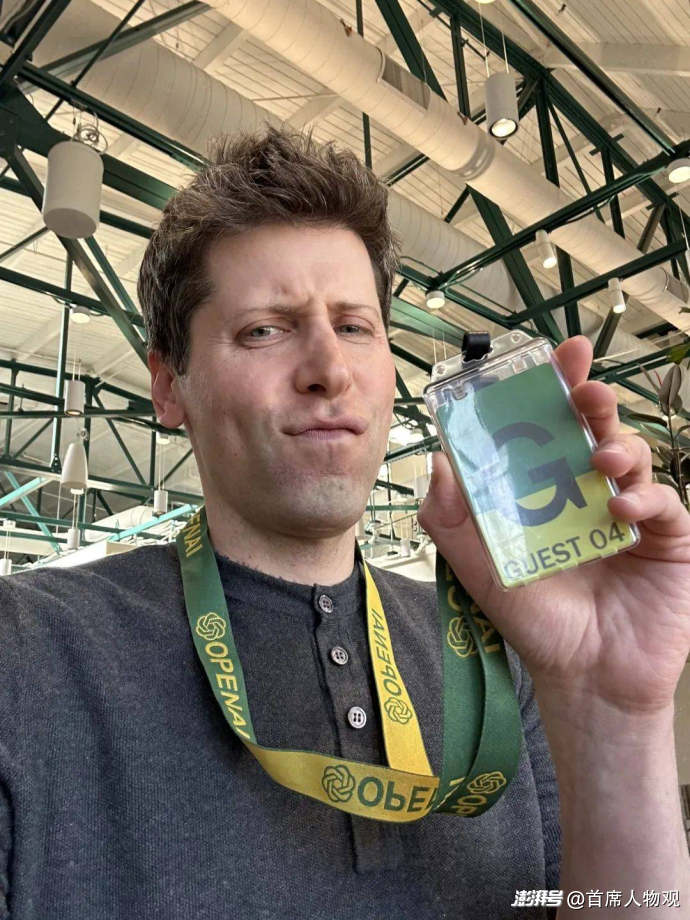
However, behind the good popularity of Silicon Valley, it took Altman at least seven years to move from the edge to the center.
In the year when OpenAI was founded, Altman had made millions with Loopt social networking site, and successfully invested in a series of start-ups and became the president of YC-this technology company has hatched dozens of companies worth billions of dollars. During his tenure, he even recruited Lu Qi to join him.
At that time, Altman made some achievements in Silicon Valley and achieved financial freedom, but the influence of early OpenAI came more from another co-founder, Musk.
Altman, who has just started to emerge in Silicon Valley, according to Zhou Hengxing, a reporter who observed and interviewed him in the early days, his first impression seems to be nothing special, and he can even be said to be a typical Silicon Valley entrepreneur: young, pale, geeky, fast-talking, just passionate about how to change the world through entrepreneurship.
In that year, the official release of the SUV Model X model and the successful recovery of the first-class rocket of Space X Falcon 9 made Musk a "generalist" across the fields of automobiles, aviation, energy and artificial intelligence.
Facts have proved that many funds and contacts of OpenAI in the initial stage were brought by Musk.
Nine years ago, when Huang Renxun presented the world’s first DGX-1 supercomputer to OpenAI for the first time, he left a message "To ELON &THE OPENAI TEAM!" Without mentioning Altman’s name at all. In the photo materials left by the big meeting, Altman was not seen either.
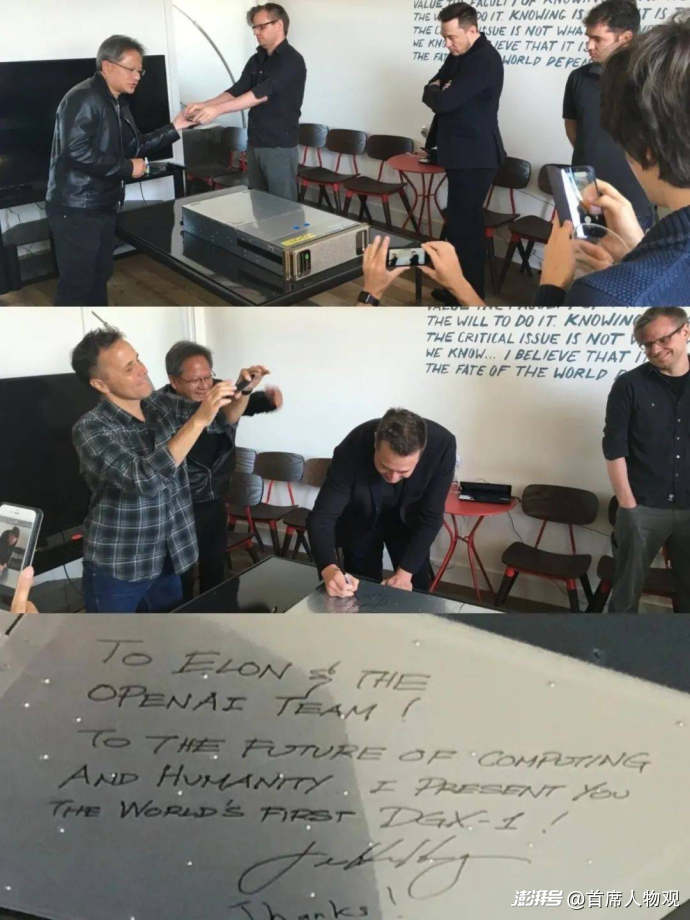
Until 2018, due to the disagreement of ideas, after Musk left, OpenAI officially entered the Altman era.
In November 2022, ChatGPT snapped up 100 million monthly users in two months, becoming the fastest growing consumer application in history.
ChatGPT’s popularity has also made Altman gradually replace Musk as a rookie of social media.
02 Expand the circle of friends
Flowers and applause belong to the honored.
Bill Gates was wrong about Altman, and he opposed Nadella’s investment in OpenAI.
However, after ChatGPT completely ignited the Silicon Valley science and technology circle and even the whole world, the elder gave all his praise to the younger generation, and said that he saw himself in Altman, who was 30 years younger than himself, and saw a great talent that both of them had: they were good at seeing the coming turning point and became an important accelerator of the turning point.
After the release of GPT-4 in March 2023, Bill Gates once again praised OpenAI’s GPT artificial intelligence model. Even in his personal blog, he wrote an article entitled "The Age of Artificial Intelligence has Arrived". Bill Gates called AI "the hottest trend in 2023" and thought that ChatGPT would change the world, which was as important as the advent of the Internet and personal computers.
After that, Altman kept in good contact with Bill Gates, and in January 2024, he also participated in the recording of Gates’ podcast "Solve My Confusion".
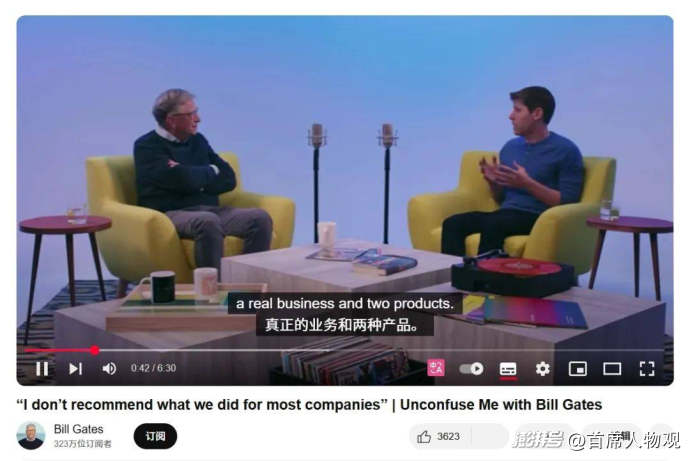
It can be said that at that time, relying on the famous Altman, many people hoped to communicate and contact with him.
It’s not hard to understand. For Silicon Valley in the United States, AI has a natural attraction. Almost every tech entrepreneur was a sci-fi fan when he was a child, dreaming of changing the world. After the worldwide popularity of ChatGPT triggered a new round of technological revolution and heated discussion, Altman could easily make people believe that he was the one who changed the world.
An enterprise executive who contacted him at that time said: "He may weigh only 110 pounds (about 50 kilograms), but he can let a group of middle-aged people walk around him and listen to his’ sermon’ like listening to the gospel. Anyone who has seen him wants to have his ability. " In the eyes of many people outside, this is the personal charm of Altman.
Even Zuckerberg, who has a competitive relationship with Altman in the big language model, praised Altman for his thoughtful and serious attitude in a foreign podcast interview last February, and expressed his appreciation for his ambition in the field of artificial intelligence.
Last March, the two even had a closer business intersection. Altman joined the AI pharmaceutical company founded by Zuckerberg and became a new board member of its CZ Biohub.
Being able to get along well with various Silicon Valley tycoons is also due to Altman’s own efforts. He attaches importance to maintaining the relationship with partners.
At the annual developer conference of Microsoft Build in 2024, Altman, as the most important partner of Microsoft, came to the finale, and discussed the relationship between AI and developers with Kevin Scott, CTO of Microsoft, and also talked about the GPT-4o to be released at that time, and praised that it was inseparable from Microsoft’s help, that is, it provided a larger supercomputer.
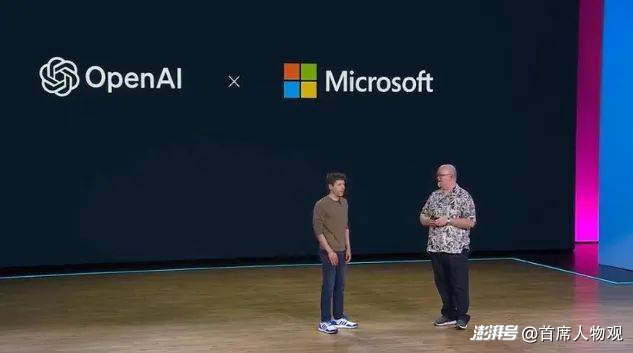
In the past two years, Altman has continuously and actively improved his ability to deal with the government and expanded his contacts into political circles.
In May 2023, Altman had dinner with more than 60 members of the House of Representatives the night before his first hearing in the US Congress. According to the participants, he was very skillful, sometimes talking about the potential of artificial intelligence, and sometimes showing how ChatGPT can quickly start a speech.
Some members of Congress later said that Altman was calm, confident and reassuring. Another senator who had been in contact with him for a long time commented that he had never seen such a smart person as Altman. "He is very good at building relationships with members of Congress."
According to reports, the controversy of the hearing on that day was far lower than that of celebrities in the scientific and technological fields such as mark zuckerberg, CEO of Facebook (now Meta), and Zhou Zui, CEO of TikTok.
After that hearing, many lawmakers expressed their appreciation for Altman’s frank attitude of acknowledging the hidden dangers of generative artificial intelligence and calling for supervision. "He was born with the ability to persuade people." Graham, Altman’s mentor, once commented on him.
After that, Altman also visited all major countries in the northern hemisphere and met with European leaders. The long list included British Prime Minister Sunak, French President Macron, Spanish Prime Minister and Polish Prime Minister, and discussed the development potential, threats and supervision of artificial intelligence.
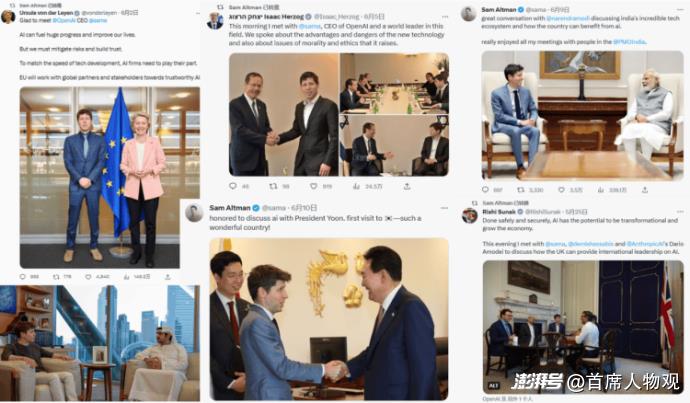
According to media statistics, in a few weeks, he visited 22 countries surprisingly, always maintaining a humble attitude, being friendly and enthusiastic, declaring to the leaders of various countries that he supported the supervision of artificial intelligence, but at the same time expressing his concern about excessive supervision.
03 ambitious master
Altman’s younger brother once stressed when recalling their childhood game scenes that Altman was very concerned about winning or losing, and always said, "I must win, and everything is up to me."
Behind the strong winning and losing heart, Altman likes to control everything.
Paul Graham, Altman’s mentor and famous investor, once told reporters that Altman likes and is good at using power and controlling everything, which has almost become his unique label. "You drop him on an island full of cannibals, come back in five years, and he will become king." In paul graham’s view, Altman’s most powerful and striking ability is his wrist in controlling power.
Even in interpersonal relationships, he is no exception-he likes to be the dominant party.
Karen Hao, a journalist who has interviewed Altman for 300 times and published Empire of AI this year, once said that when Altman talks with others one-on-one, he can always say what the other person wants to hear, so as to establish a deep relationship and connection.
According to Karen Hao, Altman approached Musk and llya Sutskever very skillfully and took the initiative to establish contact. The former raised a lot of money for OpenAI and recruited talents from top companies in the technology industry such as Meta, Apple and Amazon. The latter became the chief scientific officer of OpenAI and provided great technical support for ChatGPT.
Altman is very good at finding common topics, technology and AI-related topics, which is usually the focus of his discussion with American technology leaders.
In Silicon Valley in 2015, Altman was a rare person who talked openly about AGI (Artificial Intelligence) except Musk. As one of the few technology entrepreneurs who discussed AGI in the Silicon Valley circle at that time, Altman once attended the same party with Musk, expressing his position that he had the same concern about AI, that is, the potential threat of AGI to the future of mankind.
In order to win over llya Sutskever, Altman also spent some time. According to Altman’s interview with How to Build the Future last year, "I wanted to know him after watching his videos on YouTube. I sent him an email, but he didn’t reply, so I went to a meeting where he gave a speech. We met and had a good chat, and we pursued the same goal of AGI. "
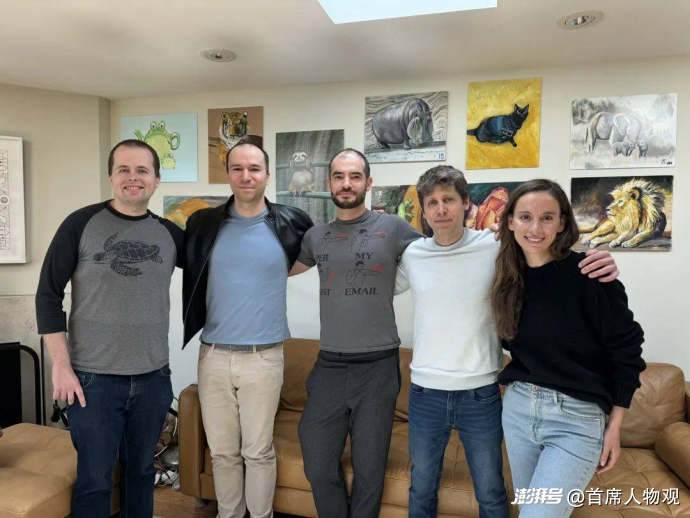
Figure: llya Sutskever (middle)
A similar plot also made Altman and Microsoft catch up.
Altman once said frankly that ChatGPT will not be used to make money, but OpenAI needs a lot of money to pay for the huge computing power needed by the AI model.
In 2018, Musk left with all the funds because he didn’t agree with Altman on the concept of company development. That year, Altman explored various schemes to raise more funds for OpenAI, such as seeking government funding or launching a new cryptocurrency. He said: "No one wants to fund this research. It was a really difficult time."
To this end, Altman had to create an "encounter" in the stairwell of the Sun Valley Conference, introduce himself to Nadella and promote OpenAI, and successfully pulled in a $1 billion capital injection from Microsoft, which became a lifeline for OpenAI.
For Altman, interpersonal communication at that time was more of a business need. OpenAI needs to have a "good relationship" in the Silicon Valley circle to raise a lot of money and resources.
This practice has indeed brought rapid development to OpenAI.
In the past six years, Microsoft has continuously invested in OpenAI, with a cumulative amount of US$ 13 billion, making it the closest partner of OpenAI. During the most intimate period between the two parties, Nadella sent five or six short messages to Altman every day, and Altman also repeatedly conveyed to the outside world that Microsoft was the strongest cooperative relationship in the scientific and technological field.
The same is true with NVIDIA and Huang Renxun. According to a set of statistics of SemiAnalysis in 2023, OpenAI used about 3,617 HGXA100 servers, including nearly 30,000 NVIDIA GPUs, and Microsoft, which supplied OpenAI chips, became the head customer of NVIDIA.
But in the business battlefield, the relationship can easily change with the conflict of interests. There are some signs that the relationship between Altman and his partners has undergone subtle changes.
First, at the beginning of last year, Altman announced the core-building, NVIDIA, backstab; Then, at Microsoft’s Build Developer Conference in May this year, Altman only remotely connected to the Microsoft platform online, which was less sincere than last year. Of course, there are also media analysis, which is because of Musk, who is also a guest. (After Musk quit OpenAI, the two were in a competitive relationship and staged a war of words on social media from time to time)
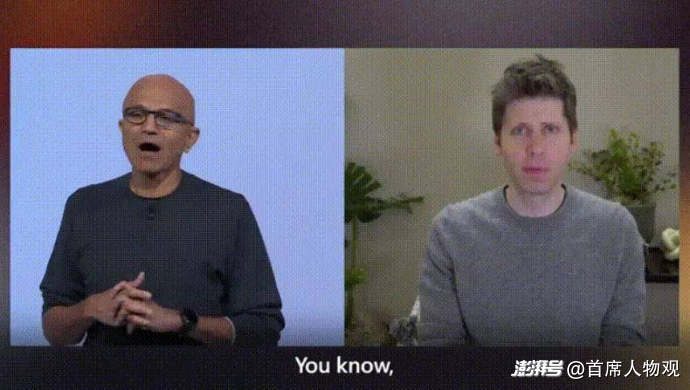
Altman, who has stood at the peak and has more prospects, seems to have become a "roadblock" for him to achieve greater ambitions.
Like Microsoft. For Altman, OpenAI hopes to weaken Microsoft’s control over its AI products and computing resources, and hopes to get Microsoft’s support for its transformation into a for-profit company. Whether Microsoft approves this transformation is the key to whether OpenAI can raise more funds and finally go public. Because as a non-profit organization, OpenAI does not have the conditions for large-scale financing.
However, according to informed sources, the negotiation process was so difficult that OpenAI executives were even prepared to accuse Microsoft of anti-competitive behavior during the cooperation between the two parties.
Like NVIDIA. Because the price of chips continues to rise, OpenAI is being forced to "donate" the money earned by its hard research and development of AI to NVIDIA. Secondly, the uncontrollable factors of GPU shortage are indeed restricting the development of AI company.
Altman once complained in a closed-door discussion in mid-2023 that the shortage of GPU disrupted OpenAI’s short-term plan. Before the release of GPT-4, he had planned to increase the context length of ChatGPT to 32k token, but this expectation was not realized for a long time after GPT-4 went online.
As a party who likes to be in control, Altman really can’t accept that OpenAI is always under the shackles of Microsoft and NVIDIA.
To this end, from the beginning of 2024, Altman frequently discussed cooperation with South Korean chip giants Samsung and SK, and also negotiated with TSMC and Middle Eastern investors including the United Arab Emirates artificial intelligence group G42, and revealed plans to raise 7 trillion US dollars to build cores and reshape the global semiconductor industry.
In addition to the anxious relationship with old partners, Altman’s performance this year is quite different from the previous "friendliness" and "sincerity", and it seems that he is becoming the public enemy of Silicon Valley technology giants.
On February 28th this year, it was reported that Meta AI, the AI assistant of Meta, was about to become an independent application of the social media company, targeting competitors such as OpenAI and Google’s parent company Alphabet. In response, OpenAI Altman responded: "Why don’t we make a social APP?" And wrote in the comment area of social media, "If Facebook wants to find us trouble, we will directly’ kill’ them, and the scene will be super funny."
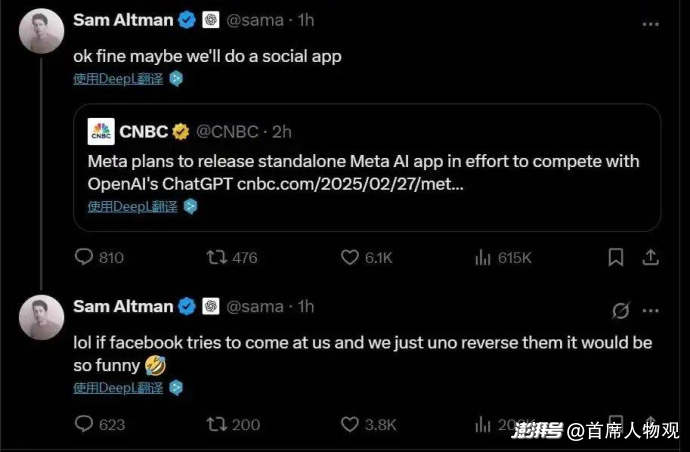
This is not the first time Altman has fought a war of words.
Previously, Musk, who had quarreled with Altman, repeatedly bombarded OpenAI on social media, and proposed that a non-profit organization that could spend $97.4 billion to acquire OpenAI was responded by Altman when it was merged into xAI. "No thanks, but we can buy X for $9.74 billion."
In addition, on May 21st, Altman announced that OpenAI had acquired the former Apple chief designer startup company for $6.5 billion, and it is expected that new AI hardware equipment will be pushed next year. This is the largest acquisition of OpenAI to date, which shows that OpenAI attaches importance to this project.
Altman has repeatedly publicly criticized the separation of existing hardware and AI, and once the AI-based soft and hard integrated device is made, OpenAI will establish an independent entrance through its own hardware, which is likely to have an impact on Apple, and Apple’s IOS ecosystem will no longer be a moat.
Recently, an internal strategy document "ChatGPT: Strategy for the First Half of 2025" formulated by OpenAI at the end of 2024 reveals OpenAI’s ambition: it plans to turn ChatGPT into a "super assistant" with "T-skills" to challenge the market position of existing AI assistants such as Apple Siri.
It seems that it is not a wise choice to be tough with the big names in the Silicon Valley circle in the United States.
But behind becoming a "public enemy of Silicon Valley", Altman obviously has his own plans. Among the people who contacted Altman, many people reported that no matter what his motives were, he always benefited the most in the end.
04 pragmatic businessman
Altman’s colleague Thiel once praised his ability to balance OpenAI’s priorities: no one is better suited to seek a balance between "idealism" and "reality".
At the beginning of OpenAI, Altman and his team had a grand vision: to realize open and shared AGI, to fight against the monopoly of artificial intelligence by large companies or a few people, and to ensure that the benefits brought by artificial intelligence are widely and equally distributed by all mankind. This is also the original intention of his co-founding OpenAI with Musk and others-breaking Google’s monopoly position at that time.
But for idealists, before talking about ideals, the first thing is to fill their stomachs.
On the one hand, Altman needs to prove to investors that he can make money like a consumer internet company through the performance of the revenue side. On the other hand, the research and development of large models is a game of burning money, and Altman needs constant capital and resources to replenish ammunition for the company’s development.
To this end, Altman has set his sights on the world, while opening up sources in "financing" and cutting down on "chip spending".
Since last year, Altman has been looking for new employers. He frequently visited Middle East countries and discussed cooperation with sovereign funds of Saudi Arabia, United Arab Emirates and other countries. In October, OpenAI completed 6.6 billion US dollars of financing, with investors including Thrive Capital, NVIDIA, UAE Sovereign Wealth Fund and Softbank.
At the same time, Altman is also actively looking for a computing power replacement pool. In March of this year, OpenAI announced that it had reached a five-year contract with CoreWeave, an AI cloud computing provider, worth $11.9 billion. This transaction allowed OpenAI to develop its own big model with greater confidence without worrying about being limited by Microsoft’s cloud computing.
In the chip part, Altman first reached an agreement with Sun Zhengyi last year to jointly develop AI chips. In addition, Altman teamed up with Su Ma to release AI chips such as Instinct MI400 and Instinct MI350 series at the 2025 Global AI Development Conference held by AMD a few days ago. Compared with competitors, the power consumption of MI350 series is lower. The MI355X, which will be released in the second half of the year, can provide 40% more token per dollar than NVIDIA chips, helping OpenAI to improve its computing power.
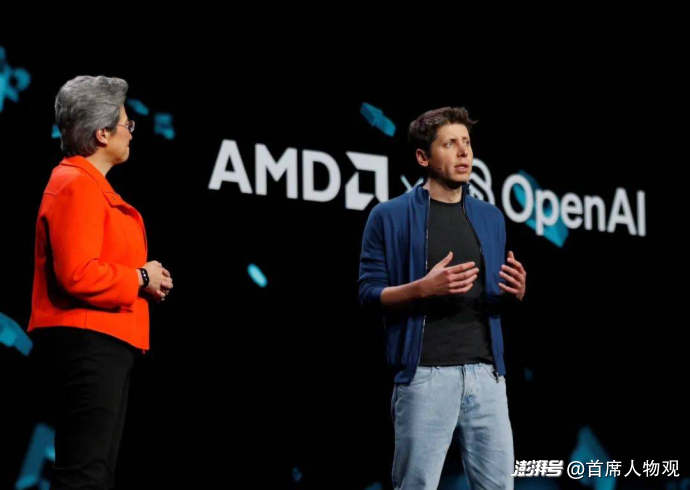
At the same time, the fierce competition in the industry has enabled Altman to turn OpenAI from an elite technology laboratory into a global commercial money-making machine at an unprecedented speed.
According to OpenAI’s disclosure to investors, it is estimated that the company’s annual revenue will reach $125 billion by 2029, and further increase to $174 billion by 2030-close to the current income level of NVIDIA or Meta.
This makes many of Altman’s decisions more commercial.
For example, on May 23rd this year, OpenAI reached a strategic cooperation with G42 in the United Arab Emirates to jointly build the world’s largest AI data center cluster in Abu Dhabi. This project belongs to OpenAI’s "Stargate" plan. By expanding the market outside the United States, it aims to help OpenAI accelerate the deployment of AI in vertical fields such as medical care, finance and industry in many countries.
From the perspective of OpenAI, the expansion of Stargate is a ChatGPT service tailored for citizens of other countries according to local needs, which will undoubtedly increase its market share and contribute revenue to it on a global scale.
Even in personnel transfer, Altman has specially created a new position-"CEO of Applications", which will be responsible for leading the product, business and operation team of OpenAI, promoting the commercialization of the company’s research results, including core applications such as ChatGPT, and reporting directly to Altman.
On June 17th, ChatGPT manufacturer OpenAI signed a one-year contract with the US Department of Defense, worth 200 million US dollars, to provide artificial intelligence tools for the Department of Defense. At the end of last year, OpenAI also announced that it would cooperate with Anduril to deploy advanced artificial intelligence systems for "national security tasks".
Behind its rapid commercialization lies Altman’s anxiety.
During the Spring Festival this year, Deepseek quickly attracted a large number of small and medium-sized enterprises and developers through the open source model and extremely low training cost, which directly impacted OpenAI’s paid API subscription model, promoted technology equality, and forced Altman to adjust his strategy and frequently compete in commercialization decisions and actions to maintain its original leading position.
Since then, Altman has hardly continued the previous press conference style of squeezing toothpaste and keeping people’s appetite, frequently updated the dynamics on social networking sites, and sometimes released multiple functions and preferential policies in one breath, released a new reasoning model o3-mini, and opened the reasoning model to free users for the first time, opened the ChatGPT search function to all users, and did not need to register, so that OpenAI was firmly set on the AI hot search list.
This wave of operation is really effective. According to the report "Usage Trend of Artificial Intelligence Model in Spring of 2025", the share of GPT-4.1 series of OpenAI reached about 10%, ranking first.
Compared with OpenAI, which moves frequently on the application side, Deepseek is as low-key as Liang Wenfeng, and it has ushered in a decline in heat. But compared with Altman’s rapid pursuit of business, Liang Wenfeng pays more attention to the technological innovation of the basic model. From the beginning of this year to now, the latter has published two academic papers.
This also made Altman, who updated quickly on the product side, confident in many public occasions that ChatGPT was ahead, but he also admitted that it was difficult to say how much ahead.
But OpenAI’s competitors are not just Deepseek.
Players of AI track big models at home and abroad are accelerating. For example, Google updated the GEMINI2.5 model last month, Claude of Anthropic updated the Claude 4 series big models, and the old rival Musk recently planned to raise 4.3 billion US dollars for big model training, self-built data center and high-performance chip procurement, calling it OpenAI. Byte also updated the bean bag model recently, and the price cut started a price war with OpenAI.
At present, Altman can only run blindfolded in an environment of accelerated competition.
It is undeniable that today’s more pragmatic Altman has undoubtedly led OpenAI to create greater commercial value.
But business success comes at a price.
In the original OpenAI11-member co-creation team, many founding elders and core technical backbones chose to leave, or set up their own doors to become Altman’s competitors, or they have lived in seclusion and no longer appear. The reason behind this is the collective consensus-while OpenAI is developing rapidly, Altman, who pays more attention to commercialization, is increasingly deviating from the initial intention at the beginning of its establishment.
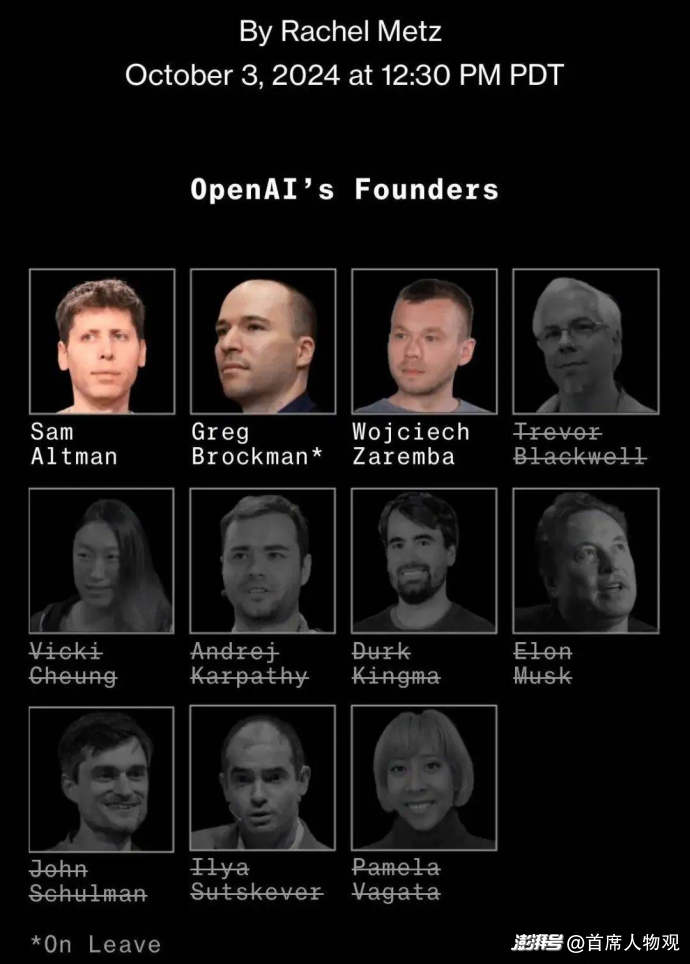
It’s hard to say whose fault it is. Change is the normal state of life, the entrepreneurial environment is changing, technology is changing, and people are changing.
Recently, it was rumored that Meta signed a contract with a bonus of $100 million to recruit OpenAI employees, but it ended in failure. For this rumor, Altman confirmed it in the blog program, and made a mockery of Zuckerberg’s "failure to rob people". At that time, Altman, I don’t know if I would have thought that those partners who fought side by side at the beginning were completely separated only in the two years after OpenAI exploded.
This is perhaps the most embarrassing part.
Heading source |AI drawing